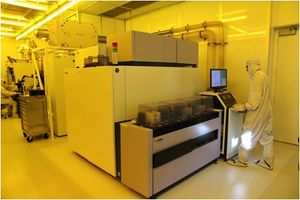Stepper 3 (ASML DUV): Difference between revisions
| Line 17: | Line 17: | ||
Resists Used: |
Resists Used: |
||
UV210-0.3 - Positive: 300nm nominal thickness |
* UV210-0.3 - Positive: 300nm nominal thickness |
||
UV6-0.8 - Positive: 800nm nominal thickness |
* UV6-0.8 - Positive: 800nm nominal thickness |
||
PEK162C - Positive: 2.5um nominal thickness |
* PEK162C - Positive: 2.5um nominal thickness |
||
UVN2300-0.5 - Negative: 500nm nominal thickness |
* UVN2300-0.5 - Negative: 500nm nominal thickness |
||
AR2/DUV42P-6/DS-K101: Anti-Reflective Coatings |
* AR2/DUV42P-6/DS-K101: Anti-Reflective Coatings |
||
PMGI: Underlayer |
* PMGI: Underlayer |
||
AZ300MIF Developer for all processes |
AZ300MIF Developer for all processes |
||
See Lithography Process page for details, where available |
|||
= Process Information = |
= Process Information = |
||
Revision as of 21:33, 3 June 2016
|
About
The ASML 5500 stepper is a 248nm DUV stepper for imaging dense features down to below 200nm and isolated line structures down to below 150nm. The full field useable exposure area is limited to the intersection of a 31mm diameter circle and a rectangle of dimensions 22mm x 27mm. The system has a variable NA system and has a square field image size of 21 x 21mm for 0.63 NA and a square field image size of 22mm x 22mm for 0.4 to 0.57 NA. Other rectangular sizes available: 21mm x 23mm; 20mm x 24mm; 19mm x 25mm; 18mm x 25.5mm; 17mm x 26mm; 16mm x 26.5mm; 15mm x 27mm. Overlay accuracy is better than 30nm. The system is configured for 4” wafers and, with staff support, mounted pieces down to 14mm in size can be exposed using a 4” wafer as a carrier.
Resists Used:
- UV210-0.3 - Positive: 300nm nominal thickness
- UV6-0.8 - Positive: 800nm nominal thickness
- PEK162C - Positive: 2.5um nominal thickness
- UVN2300-0.5 - Negative: 500nm nominal thickness
- AR2/DUV42P-6/DS-K101: Anti-Reflective Coatings
- PMGI: Underlayer
AZ300MIF Developer for all processes
